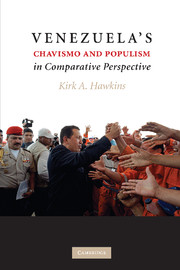Book contents
- Frontmatter
- Contents
- List of Tables
- Preface
- Acknowledgments
- 1 Introduction
- 2 Chavismo, Populism, and Democracy
- 3 Measuring the Populist Discourse of Chavismo
- 4 Party System Breakdown and the Rise of Chavismo
- 5 The Causes of Populism in Comparative Perspective
- 6 Populist Organization: The Bolivarian Circles in Venezuela
- 7 Populist Policy: The Missions of the Chávez Government
- 8 Conclusion
- Appendix A The Populist Speech Rubric
- Appendix B Test of the Sampling Technique
- Appendix C Test of Interaction Effects
- References
- Index
Appendix B - Test of the Sampling Technique
Published online by Cambridge University Press: 17 May 2010
- Frontmatter
- Contents
- List of Tables
- Preface
- Acknowledgments
- 1 Introduction
- 2 Chavismo, Populism, and Democracy
- 3 Measuring the Populist Discourse of Chavismo
- 4 Party System Breakdown and the Rise of Chavismo
- 5 The Causes of Populism in Comparative Perspective
- 6 Populist Organization: The Bolivarian Circles in Venezuela
- 7 Populist Policy: The Missions of the Chávez Government
- 8 Conclusion
- Appendix A The Populist Speech Rubric
- Appendix B Test of the Sampling Technique
- Appendix C Test of Interaction Effects
- References
- Index
Summary
In order to further check the robustness of our sampling technique, I had my assistants score large, randomly selected sets of speeches by two Latin American presidents, Lula and Cárdenas. Collecting larger samples for all of the chief executives would have been too expensive. I selected these presidents because their discourse would be more difficult to measure (both were perceived as only mildly populist, somewhere between 0 and 1), thereby presenting us with a harder test, and because my assistants and I were reasonably certain that we had the entire universe of their speeches. We randomly selected one speech from each month of their respective terms in office, 42 speeches for Lula and 60 for Cárdenas.
Because of the large numbers of speeches, I asked the graders to dispense with any note-taking or other written analysis other than a short set of comments and a grade; thus, this was also a test of a more truly holistic grading technique than we used in the previous two phases of the study, when I asked graders to compile notes on each of the elements of populist discourse. This new grading technique was much faster (typically requiring 15 minutes per speech instead of 30–45 minutes). Two native Portuguese speakers and two native Spanish speakers conducted the grading, taking about four weeks to complete the task.
- Type
- Chapter
- Information
- Venezuela's Chavismo and Populism in Comparative Perspective , pp. 255 - 258Publisher: Cambridge University PressPrint publication year: 2010



